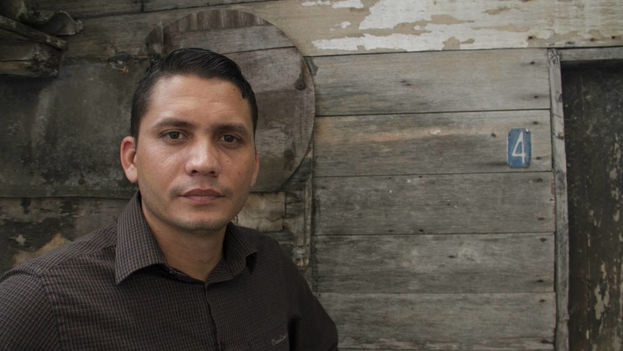
![]() 14ymedio, Havana, 14 August 2017 – The Office of the Attorney General of Cuba declared the “final dismissal” of the case against the activist Eliécer Ávila, accused of the crimes of receiving and illegal economic activities. The court also ordered the seizure “in favor of the Cuban State” of most of the property seized during a police search in April.
14ymedio, Havana, 14 August 2017 – The Office of the Attorney General of Cuba declared the “final dismissal” of the case against the activist Eliécer Ávila, accused of the crimes of receiving and illegal economic activities. The court also ordered the seizure “in favor of the Cuban State” of most of the property seized during a police search in April.
On 5 August, the leader of the Somos+ (We Are More) Movement received on a document signed by the prosecutor Bileardo Amaro Guerra dated July, to which he gave 14ymedio access. In it he is informed that the accusations have been “filed.” “We have considered the lack of criminal record of the accused and the attitude maintained during the process,” explains the text.
The measure adopted by the Public Prosecutor’s Office corresponds to what was stated in the Law of Criminal Procedure, whereby the prosecutor has the power to dismiss a case “if he considers that the act is not a crime or is manifestly false, or the accused as authors or accomplices are exempt from criminal responsibility.”
Avila has decided to appeal the seizure of his belongings, of which only three personal organizers, an almanac and an old travel insurance policy were returned to him. The remaining belongings, whose list in the judicial document covers ten pages of objects seized during search, will pass into the hands of the State, including a personal computer and mobile phone.
Avila’s defense lawyer, Osvaldo Rodríguez Díaz, has appealed the prosecutor’s order because the document is full of “gibberish.” “In its content it refers to activities of a non-governmental organization,” in reference to Somos+, but the accusation against the activist is based on an alleged economic crime.
Rodríguez also questions that, given the economic nature of the allegations, the case has been taken to Villa Marista, the headquarters of State Security in Havana.
The prosecutor’s document says Avila “sells clothing at home, when what was actually seized is something else,” says the defense lawyer, for whom the arguments are “far from being considered serious by that instance, of legality and truth.”
Wilfredo Vallín, President of the Law Association of Cuba, confirmed to 14ymedio that “the final destination of the items that are seized in a search should be decided by the court” and that “what is seized in a house is to be presented in court as evidence to indict the person.” He describes the prosecutor’s order as “a totally illegal procedure” in this case because “it is a group of objects of high value.”
The search in Avila’s house happened after several members of his movement held a protest at the International Airport Jose Martí of Havana to demonstrate against Customs, which confiscated the belongings of several activists who returned from a seminar organized in Colombia by the Center for the Opening and Development of Latin America.
Police records and searches of dissidents have become a growing practice in the past year, and the Cuban Commission on Human Rights and National Reconciliation has denounced this in its reports.
